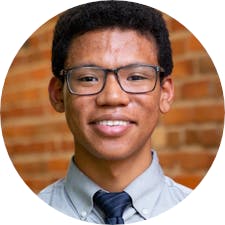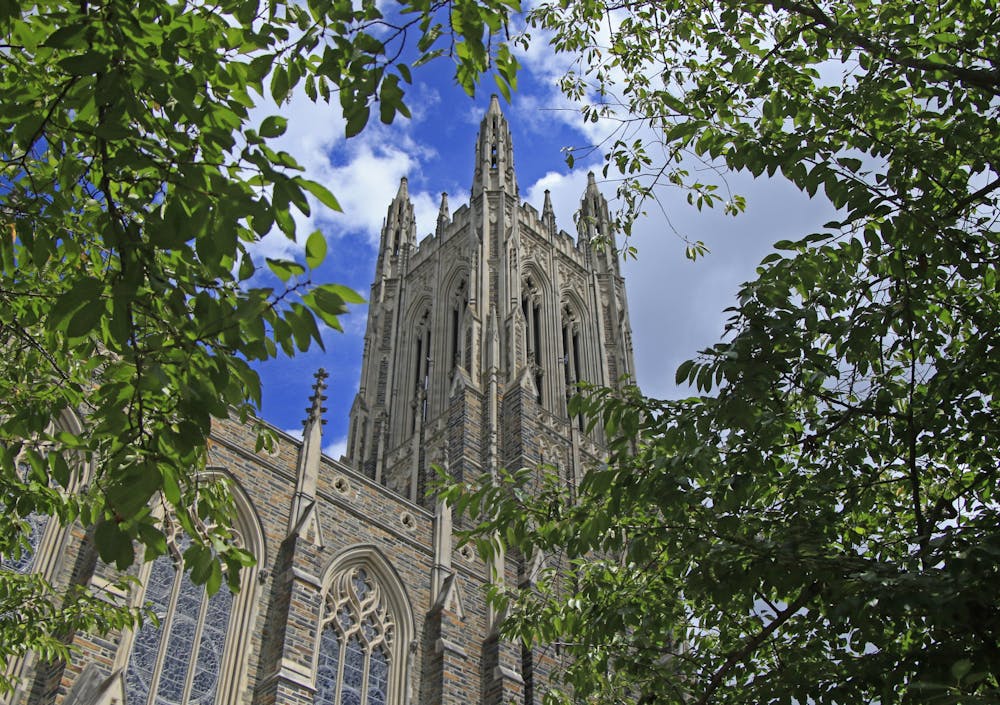The three undergraduate Young Trustee finalists shared their vision of the role in an open forum Tuesday at Rubenstein Library. The forum provides an opportunity for the student body to hear from the finalists and provide input on the selection process.
Young Trustees, who are selected from the Duke student body, serve three year terms on the Duke University Board of Trustees. This year’s selection process began in the fall with the selection of the Young Trustee Nominating Committee. In February, the committee nominated three seniors as the Undergraduate Young Trustees finalists.
Margaret Epps, secretary to the Board of Trustees and chief of staff to the Duke president, gave open remarks explaining the origin and purpose of the Young Trustee position. Each Young Trustee serves a three year term, as an observer in the first year, then as a voting member in the remaining two. Young Trustees prepare for and attend four board meetings a year alongside the meetings of their standing committees and strategic task forces.
“Young trustees are not student trustees – that is students placed on the board to advocate around student issues. Rather, the Young Trustee is in place to ensure that the board includes individuals who are closer to the experience of today’s Duke,” Epps explained.
Senior Robby Phillips, the chair of the YTNC, moderated the talk. Phillips began by asking the finalists to introduce themselves.
Finalist Drew Flanagan, a statistical science major from Montclair, N.J., started outlining the importance of education in his life. “Throughout my entire life and my family’s story, education has been a constant,” he said, sharing a humorous example of starting a stuffed-animal school in his closet in the first grade.
“I’ve also come to understand that Duke is at a critical juncture. The University is reconciling the past with our present values, to forge a more innovative and equitable second century,” he said, mentioning the upcoming centennial in 2024.
Flanagan has taken many roles on campus as a Board of Trustee and Racial Equity Advisory Committee undergraduate representative, the chair of the Student Organization Funding Committee, a Bass Connections researcher and the senior class president. If he were to become a trustee, Flanagan hopes to “make it a regular practice to meet with student leaders, faculty and staff.”
Hailing from Cornwall, N.Y., finalist Sydney Hunt is Reginaldo Howard Scholar and a Duke STEM Pathways for Inclusion, Readiness, and Excellence (SPIRE) Fellow majoring in electrical and computer engineering and computer science.
Unlike most previous Young Trustees, Hunt does not have the “traditional student government experience” and will be pursuing a PhD in electrical engineering at Stanford University instead of entering the workforce. However, she believes that she can bring a different perspective to the board.
“Only one engineer has ever served in the Undergraduate Young Trustee position, and that was six years ago,” she noted. Hunt cited her experience in engineering as a benefit, which helps her understand how to identify risks and work toward solutions.
Finalist Effie Mehbod is a public policy and Asian and Middle Eastern studies double major from Minneapolis, Minn. Her upbringing in the Midwest has taught her to see all sides of an argument and have respect for other beliefs and opinions.
“It’s important to take into account all that everyone has to say, because when we have diverse perspectives, we're able to create more methods, solutions, and drive forward change,” she said.
Mehbod cites her undergraduate studies as an opportunity to learn “the importance of good governance.” She also has served in Duke Student Government for the past three years, and plans to work in consulting following graduation.
For the first question, Philips asked the finalists about the Duke Climate Commitment’s potential to be transformative and impactful, and how it aligns with Duke’s strategic vision.
Mehbod praised Duke’s goal to be carbon-neutral by 2050 and sees clear objectives in the Commitment. She cites the University’s values of “excellence, curiosity and respect” as fitting with the goal of “becoming the top climate research institute.”
Flanagan emphasized the Committment’s pillars: teaching and learning, research, external partners and campus operations. “It’s important to take a multifaceted approach,” he said, and he believes that it has the ability to transform Duke.
Hunt commented that the commitment is to Duke’s current and future students. “That is ensuring that we're being respectful of those who are going to take foot on this campus, decades from now, centuries from now, even if we won’t be here to see it,” she said. She also praised the hiring of Pratt School of Engineering Dean Jerome Lynch, whose research is in environmental engineering.
When asked about Duke’s centennial in 2024, the finalists reflected on Duke’s history through both a celebratory and critical lens — recognizing the strides Duke has made and also what is left to do. Flanagan touched on the possibility of involving alumni and telling Duke’s history with a focus on identity groups’ advocacy work or relationships with external groups. Hunt focused on “recognizing that what is considered normal now may be different than what was in the past,” citing name changes to Duke’s buildings as an example. Mehbod noted leveraging the “global community” of alumni and highlighting Duke’s history and relationship with Durham.
Noting the ongoing curriculum redesign for Trinity College of Arts and Sciences, Philips asked the finalists about what they would change and preserve about the current curriculum.
Hunt and Mehbod suggested the possibility of expanding online education in the Duke curriculum to increase accessibility. Hunt also advocated for more hands-on opportunities for students, such as partnering with companies to provide more conversations or internships. Mehbod said she thinks the liberal arts focus and Trinity requirements should be preserved, though she sees spaces for innovation and improvements. Flanagan discussed incorporating “skills required to be a global leader and citizen,” and proposed “basic coding requirements or a basic public policy element to help students code, write and be active participants in our world today.” He also noted the need to revamp graduate education to create a “cohesive, community-driven and interdisciplinary opportunity for doctoral students.”
For the final question, Philips asked the finalists how they would balance life after Duke with the responsibilities of the Young Trustee position.
“You make time for what matters to you,” Mehbod responded. She hopes to maintain her connections with younger students, faculty, and administrators. Flanagan is committed to staying updated on higher education through his reading, and hopes to bring his knowledge from the financial industry to the role. With the connections that Duke has given her, Hunt looks forward to maintaining her connections with Duke as an alumna.
Students who have attended the open forum or watched 90% of the recording of the meeting, can complete a survey to provide input on the selection process. Responses must be submitted by 11:59 p.m. on Monday, March 27.
Based on the responses, the Young Trustee Nominating Committee will submit a recommendation to President Vincent Price. After considering the result of the survey and the recommendation by the selection committee, Price will select the Young Trustees. The selected Young Trustees will be announced in mid-April, and officially elected at the Board of Trustee meeting in May.
Get The Chronicle straight to your inbox
Signup for our weekly newsletter. Cancel at any time.

Senou Kounouho is a Pratt sophomore and a university news editor of The Chronicle's 119th volume.

